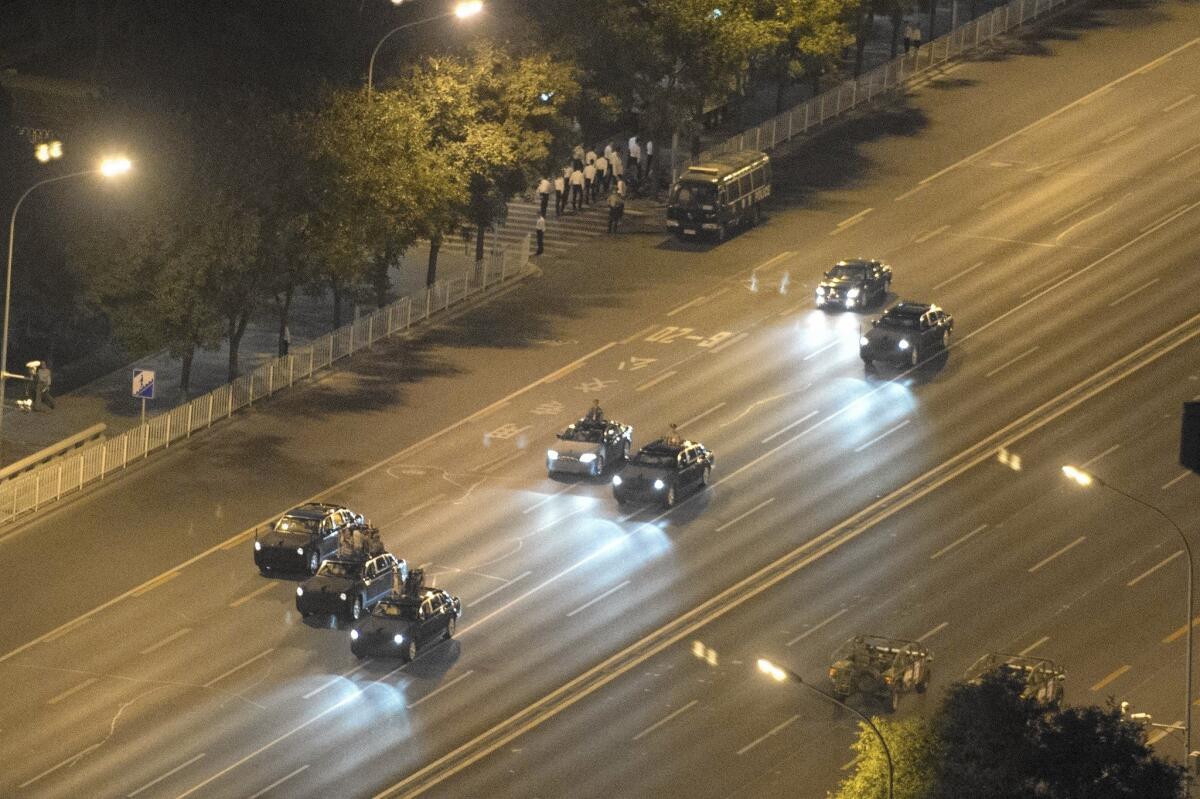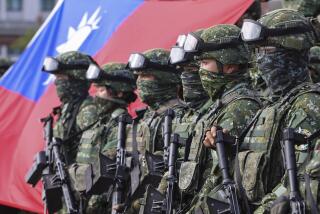In China, a host of restrictions herald a major military parade

Chinese military vehicles drive on a closed road during a rehearsal for a parade in Beijing marking the 70th anniversary of the end of World War II in Asia.
Xiao Qing knows the drill. First, the Communist Party announces an event with great fanfare — a political summit or perhaps a major sports tournament. Then Beijing authorities cancel flights, close schools, order cars off the roads and enact a host of other seemingly arbitrary restrictions that make daily life in the capital an exercise in inconvenience.
So when Xiao heard about plans for a massive military parade Sept. 3, she knew what was coming.
“What can we do if we don’t like it? Nothing,” said the 27-year-old graphic designer. “So it doesn’t matter whether [the restrictions] are inconvenient or not. We all have gotten used to it.... None of my family or friends even spend time and energy complaining.”
The parade to mark the 70th anniversary of the end of World War II in Asia is to feature an elaborate procession of marching soldiers, rolling tanks and aerial displays over Changan Avenue, a 10-lane east-west thoroughfare stretching through Beijing. (The holiday is officially known as the “Victory Day of the Chinese People’s War of Resistance Against Japanese Aggression.”)
NEWSLETTER: Get the day’s top headlines from Times Editor Davan Maharaj >>
Authorities have announced preparatory measures in a string of state media articles: closure of the capital’s two airports for three hours on the day of the event; a mandatory school holiday; a ban on all “aerial activity” in the city (including drone-flying); temporarily closure of the Shanghai and Shenzhen stock markets; seizure of all electric bikes “without proper license plates and registration.” Officials will also impose even- and odd-numbered license plate restrictions to allow for driving on alternating dates and will ban delivery vehicles between 6 a.m. and midnight.
The military parade will be China’s fourth since 1960, and its first on a date other than Oct. 1, the anniversary of Mao Tse-tung’s 1949 declaration of the People’s Republic of China.
It is also the first under President Xi Jinping, who took the Chinese Communist Party helm in late 2012. Since then, Xi has overseen a wide-ranging anticorruption campaign, punishing more than 100,000 officials and a dozen People’s Liberation Army generals, many of whom may be seething at their treatment.
Meanwhile, China’s economy is slowing; its stock markets are in crisis. Given the developments, analysts say, Xi is not in a position to take chances.
“Xi Jinping just can’t afford to appear that he is not fully in control, fully in charge, and confident,” said Steve Tsang, a senior fellow in the China Policy Institute at the University of Nottingham.
“The inconvenience to the citizens of Beijing is not a major factor” for the authorities, he added.
At least Beijing’s notoriously smog-choked skies will probably be crystal-clear — authorities will enact temporary pollution control measures, including shutting down factories and construction sites. Similar measures during last year’s Asia-Pacific Economic Cooperation summit proved effective, leading Internet users to coin the term “APEC blue,” meaning something marvelous but fleeting.
SIGN UP for the free Great Reads newsletter >>
Although many governments enact strict security measures during major events — London installed surface-to-air missile defense systems before its 2012 Summer Olympics Games — the Chinese Communist Party has shown a penchant for taking these measures to an extreme.
Before last year’s National Day celebration, authorities mandated that 10,000 pigeons be given “anal security checks” before they were released over Beijing’s Tiananmen Square.
In 2012, before a major political conference, authorities forced taxi drivers to set the child locks on their doors and windows to prevent passengers from hurling anti-Communist Party leaflets onto the streets.
Users of Sina Weibo, the country’s most popular microblog, have responded with cynicism. “I recommend that the whole country get a seven-day vacation — only that would truly express our patriotism,” wrote one user.
“How can they launch fascist policies to conduct an anti-fascist event?” wrote another. “That’s just incredible.”
Tommy Yang and Nicole Liu in The Times’ Beijing bureau contributed to this report.
Twitter: @JRKaiman
ALSO:
Former Sri Lankan strongman Rajapaksa aims for a political comeback
Backdrop of Bangkok bombing: A country sliding into dictatorship
Chinese blasts raise questions about having a hazardous site near housing
More to Read
Start your day right
Sign up for Essential California for news, features and recommendations from the L.A. Times and beyond in your inbox six days a week.
You may occasionally receive promotional content from the Los Angeles Times.






